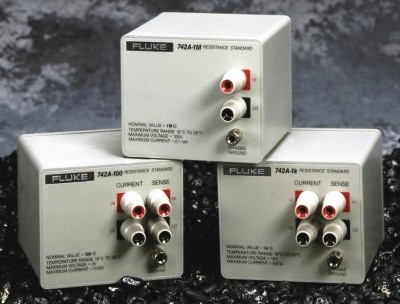
|
|
Fluke 742A-1 Resistance Standard is a high accuracy working standard for precision, on·site resistance calibration. It's excellent temperature stability allows it to be used from 18°C to 28°C with typically less than 2 ppm degradation. Using the calibration table supplied with the standards, which lists corrections in 0.5°C increments, this uncertainty can be reduced to near zero. No cumbersome oil or air baths are required. Because 742A-1 Resistance Standard is small and rugged, it is easy to transport. Care has been taken to reduce resistance changes brought about by thermal and mechanical shock. Retrace (permanent shift in resistance) is typically less than 2 ppm after cycling between 0°C and 40°C. Specifications. Nominal Value ±2ppm: 1.0 ohms. Stability 6 months: 5.0 ppm. Stability 12 months: 8.0 ppm. Calibration Uncertainty 23°C: 1.0 ppm. Max Change 18 - 28°C: ±3.0 ppm. Max Voltage 0.5 Volts.
|